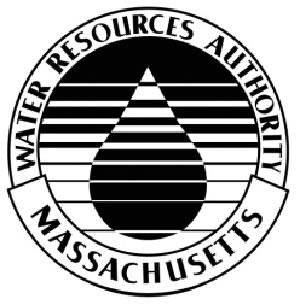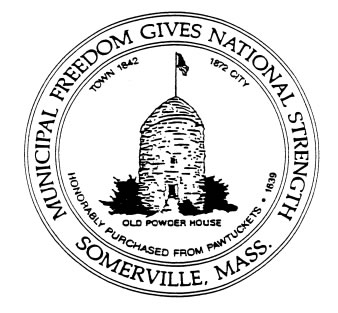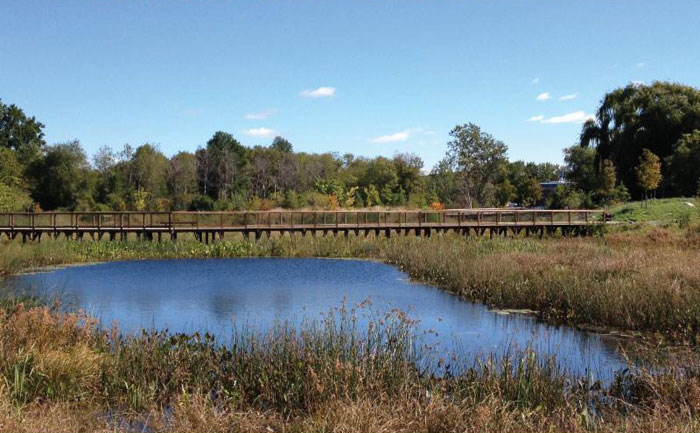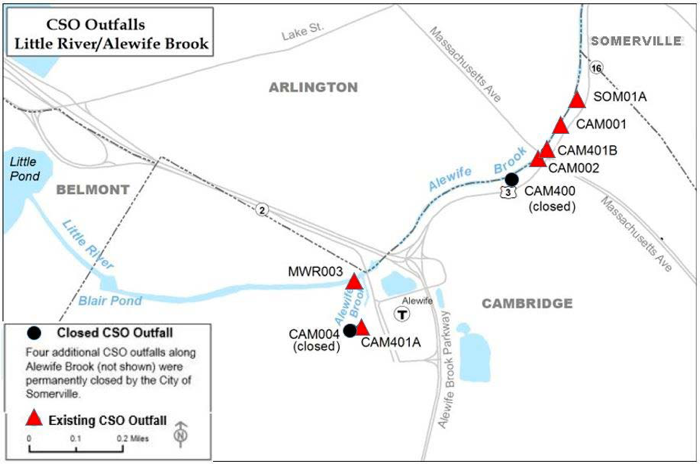This notice is required by the Massachusetts Department of Environmental Protection (DEP) as an annual update on the progress of Combined Sewer Overflow (CSO) control measures to improve the water quality of Alewife Brook. The water quality in Alewife Brook is often impaired due to bacterial and other pollutants from a number of sources, including CSOs, cross connections between sanitary sewers and storm drains, and stormwater runoff. Water quality in the Alewife Brook during both wet and dry weather generally fails to meet state bacteria standards for fishing and swimming. Contaminant sources originate in the watershed communities of Belmont, Arlington, Cambridge and Somerville, all of which are undertaking programs to identify and control sources of pollution to the Alewife Brook.
Portions of Cambridge and Somerville are served by combined stormwater and sanitary sewer systems common in older cities. Six CSO outfalls on Alewife Brook (see the map below) are designed to release CSOs (a mixture of wastewater and stormwater) during heavy rainfall to provide critical relief to the sewer system when flows exceed system capacity. While these discharges can contribute to the impairment of water quality, they are necessary to prevent sewer backups into homes, businesses and streets.
CSOs and contaminants that can get into separate stormwater pipes can include bacteria and other pathogens, oxygen-demanding pollutants, solids and other contaminants. Because of increased health risks associated with these contaminated discharges, public health officials recommend avoiding contact with the Alewife Brook during rain events and for a period of 48 hours following rainfall, as there may be increased health risks during these periods. Contact with floodwaters should also be avoided as they may contain similar contaminants and pose associated health risks. Proper precautions are necessary to minimize these risks during flooding events. DEP has developed guidance for homeowners for responding to flooding onto property from large storms or sewer backups, which can be found at which can be found on the DEP website.
As part of the 35-year old Federal District Court Order in the Boston Harbor Case (D. Mass. C.A. No. 85-0489-RGS), the Massachusetts Water Resources Authority (MWRA) is required to undertake certain corrective actions to reduce or eliminate CSO discharges to Boston Harbor, the Mystic, Charles and Neponset rivers and Alewife Brook. MWRA and its communities with permitted CSO outfalls, including Boston, Cambridge, Chelsea and Somerville, have been reducing CSO discharges since the 1980s. Major improvements to the regional wastewater collection and treatment system by MWRA and local system improvements by the communities, including the separation of combined sewers with construction of new storm drain systems, have contributed to the closing of many CSO outfalls and a nearly 90% reduction in the total annual volume of CSO discharge region-wide.
In December 2015, MWRA, in partnership with its CSO communities, completed the last of the 35 projects in the Long-Term CSO Control Plan (LTCP) approved by the U.S. Environmental Protection Agency (EPA) and DEP and mandated in the federal court order. Seven of the 35 projects have contributed to the control of CSO discharges to the Alewife Brook. Together, the seven projects have closed six CSO outfalls (more than half of the outfalls that were active in the late 1980’s) and have made great progress in achieving the LTCP goals which reduce average annual CSO volume to the Alewife Brook by 85% and reduce the frequency of CSO discharges at the most active outfall from sixty-three (63) activations a year to seven (7) activations a year. Remaining CSO discharges are predicted to comply with Class B “fishable/swimmable” water quality standards 98% of the time. For more information about the Long-Term CSO Control Plan, the projects and their CSO control benefits, and Alewife Brook water quality conditions and improvement, see MWRA’s final CSO Annual Progress Report, filed with the Federal Court in March 2016.
Attainment of the Court-mandated Levels of CSO Control
Since its CSO program began in the mid-1980s, MWRA has effectively met more than 180 federal court schedule milestones related to CSO control. The last two milestones require MWRA to commence a three-year CSO post-construction monitoring program and performance assessment by January 2018 and submit a related report to EPA and DEP by December 2020 intended to verify that remaining CSO discharges meet the levels of control in the approved Long-Term Control Plan and court order.
On November 8, 2017, MWRA commenced post-construction monitoring and performance assessments in accordance with the January 2018 milestone. The ongoing work includes CSO inspections, overflow metering, hydraulic modeling, system performance assessments and water quality assessments, which will be documented in the December 2021 report to EPA and DEP. MWRA has published three semiannual reports on the progress and interim results of this work, and will publish a fourth progress report on April 30, 2020. The progress reports are posted to MWRA’s website, at http://www.mwra.com/cso/pcmapa.html. In addition, MWRA plans to hold its second annual public briefing on the progress of the CSO assessment in late May 2020. Notice of the public briefing will be published in the Environment Monitor in late April 2020 and posted on MWRA’s website.
Water Quality Standards Variance for Alewife Brook and Upper Mystic River
Since 2000, DEP has issued a series of variances to Massachusetts Water Quality Standards that allow limited CSO discharges to Alewife Brook and the Upper Mystic River pending completion and verification of MWRA’s Long-Term Control Plan. On August 30, 2019, DEP issued to MWRA, the City of Cambridge and the City of Somerville a new, 5-year variance for their Alewife Brook CSO discharges effective September 1, 2019 through August 31, 2024. The variance includes conditions requiring the CSO assessment reports and briefings mentioned above, public information and public notifications of CSO discharges, water quality sampling and modeling, proper sewer system operation and maintenance to minimize CSO discharges and their impacts, the evaluation of specific additional measures that may further lower CSO discharges, and an updated CSO control plan to be submitted at the end of the variance period. The variance and a supporting fact sheet can be found at https://www.mass.gov/guides/sanitary-sewer-systems-combined-sewer-overflows#-2019-charles-river-basin-and-alewife/upper-mystic-river-final-combined-sewer-overflow-variances-.
For more information on CSOs and the CSO control program, visit MWRA’s, Cambridge’s and Somerville’s websites, at:





